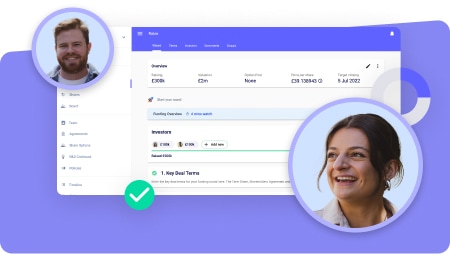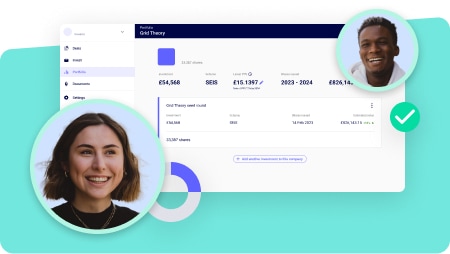Read transcript
Anthony: Hello, I’m Anthony, founder at SeedLegals, and every day I meet amazing founders on SeedLegals. And today I’m talking to Leo from Curv0 AI. Now I’m focusing in particular on the Delaware flood. Should you raise from US investors? Should you get on a plane and move to the US and I first came across Leo when his company was fundraising and it was raising from UK investors including Fuel Ventures Asia, EOS fund, that he had a Delaware company.
Anthony: So that was intriguing. And then I saw one of our earliest customers on SeedLegals, us doing a UK fund raise in a Delaware company, and no sooner had the ink dried on the funding round, then Leo was in San Francisco working on a next funding round. So I thought, I’ve got to go talk to Leo to get the down.
Anthony: What’s an all on? Should you raise from us investors when it makes sense, when it doesn’t make sense so that you get the brain dump on everything from the man himself? So, Leo. Thank you. Delighted to chat. So tell us, firstly, what does Curvo do? Who should be using it? And the product itch?
Leo: Absolutely no pleasure to to be here and happy to go into details around, us, UK set up and how we balance that out. But to start with Curvo where we’re live in call sales intelligence products. So live in your zoom meetings says real time nudges telling sellers how to handle objections, what questions to ask, enabling them to navigate high stakes conversations with ease.
Leo: And we’re both serving the US and the UK market, so we’ve put together a interesting set up with the US, Delaware Top Co and the UK operating subsidiary to get the best out of both ecosystem and simultaneously.
Anthony: Okay, so just coming back to cover the product, that sounds amazing. Every every zoom call I do these days has an I know take, but you’ve just raised the interesting point. The no take is just passive at the end. It tells you some notes. What if the no take is active and say, do do this and remember these things.
Anthony: That is amazing. That’s the future, right?
Leo: Yes, the future is assisted selling where rather than telling a seller why they’ve lost a deal after, it’s already happens. In fact, being there live in the moment like having a coach chats with you to cheer on from the sidelines and nudge and guide you when you live in that conversation and be focused on replicating the success of the top performing reps where we found as a 25% what we call a knowledge performance gap between the reps that are top performing and the long tail of the team.
Leo: And we’re bridging this through, bringing those winning patterns and serving that uniquely in a real time experience.
Anthony: Okay. And how many people at coven is the product live? It’s available. Everyone who one sales team enhancer should sign up immediately. Tell us more on that.
Leo: Yeah it’s live is in action available in the market. We’ve had a really good reception since launching. Validated the impact on win rates. Currently we have 20 customers growing every day working with large enterprises through to high growth startups. So if you’re a team that has above five account executives and looking to improve sales performance when rates deal velocity or rep ramp times covers the the right fit to help accelerate those metrics.
Anthony: That sounds great, because, I mean, I hear consistently and see consistently there’s a huge gap between your top and lowest sales performers. So if you can bring everyone up to the level of the higher ones, that’s going to be a huge improvement for a company and hugely motivating for all of your, sales team. And I guess as you onboard new ones, you know, your customers will have a much better experience as well.
Leo: Precisely. And the future of sales is leader high performance teams. Gone on the days are where headcount is stacking, and you’re using that to hit the revenue number. You’ll be more elite. SaaS smaller teams are deployed to deliver larger revenue targets. And that’s where the power of AI and directing all of the reps the same efficacy as top performers will come in to, to drive impact.
Anthony: Okay, so that sounds great. Now where are you to be a traditional UK founder? You go, great, I’m going to go and hit up UK. Investors are going to have a UK company. I’m going to leverage Slice and Ice. I’m going to show the size of the UK market initially and then look to grow. But you didn’t you, when the step different, you went, okay, what I’m going to do is I’m going to create a Delaware companies to start with because I’ve got my aspiration on bigger places.
Anthony: So walk me through, what led you to want to do that second move in a game of chess right at the beginning. And, what advice you would have and what you’ve learned along the way?
Leo: Absolutely. So inherently, I’ve had spots pool limited companies in the past, from companies in the UK and seen the, the good and the bad in the ecosystem. And I think when founding cover we, we had our sights set on series eight and series B from the beginning. And it’s very often for UK companies when they reach later rounds to do a Delaware flip to go into the US market, which is typically ten exercise for most products, and then capitalise on that to get towards becoming a unicorn eventually.
Leo: And for us, the reason for going to the US directly out the gates was a strategic move. Because eventually want to move there. So we thought that setting it up out the gate would be the right mechanism to unlock US capital position ourselves in San Francisco, whilst also benefiting from being in London. And also the enable us to kind of get the investment from the right investors without having the cost, the hassle and the trouble with doing a Delaware flip later down the road.
Leo: When, you know, it could be a more challenging setup.
Anthony: So this is a really interesting I nothing new pattern in like seven years of SeedLegals for the first six and a half years, zero people. I mean literally talked about Delaware flip and the last six months. Lots of people are talking about Delaware flips. In part, I think that’s was the messaging I’ve been doing on LinkedIn about making it easier.
Anthony: But I think the times have shifted. People are seeing a bit, may UK fundraising seeing more in the US government with increases in capital gains tax and for founders and things like that are beginning to make it more attractive to look elsewhere. And on my part, I’m, I’m looking to completely transform the ease and cost of doing it.
Anthony: So in your case, I guess you started by spending $500 on a Delaware company, and then you would have had a significant issue with creating a US funding round offering size in East to UK investors, which most people don’t know about. Right. Because the standard, you know, pattern is you you’re based in London. Your investors are probably people you’re meeting in London.
Anthony: At some point you’ll be in the US. So normally your investors are people in the same country as you. Because they know you, they know the market and so on. And that’s the place to start. So can you still keep the size and ease advantages of UK companies and UK investors while having a Delaware company? And the answer is yes you can.
Anthony: And of course proved in this case. So now let’s talk about I suppose two things. Number one, did you find friction from UK investors when you said you had a Delaware company?
Leo: For the most part, there was more friction on all sides from an admin perspective, to set up the Delaware Corporation as a UK foreign entity. I got assurances that way from an investor perspective, most of them were forthcoming and open to Delaware top coats. Only two, perhaps in 80 conversations were actually completely objective to Delaware top coats and wanted inherent UK companies.
Leo: But for the most part, you know the investors were open and that enabled us to, you know, go to investor committees and get multiple commitments from investors that you know, inherently only invest into UK entities.
Anthony: Right. So good point. So I think, you know, for investors you’re going to most of them will be seduced by the lure of much higher valuations and exits and so on in the US. Some of them will not know about us legals and things like that, but I think that number will decrease. So when we launch seed false.
Anthony: In 2018, nobody had known about SeedLegals or Asas. And, quite a few investors would query, you know, we want to price round now it’s like the most common thing. And I think the, you know, we can invest in a Delaware company. What is that in the next 12 or 24 months, it’s going to transform into a.
Anthony: Yeah, sure. Half the investment. So in Delaware companies in half. In UK companies you’ll find some funds that will have a mandate. We can only invest in a UK company and so on. Just entrenched in the fund and you know so be it. They they’re not going to be your target audience okay. So now round one done. Awesome.
Anthony: The ink is not even dry on the contracts. And you’re on a plane out in the Bay area looking at the next large around. So now you have to persuade US investors to invest. But you’ve got a nice UK accent and you’ve been talking about the same tone of voice to UK investors, where you’re not going awesome. And dialing it up to 11.
Anthony: How do you play both sets to be as attractive in the Bay area where people are talking, you know, zillions valuations, without feeling kind of really strange?
Leo: Yeah, there’s certainly a different play and you have to be a chameleon to adapt to the cultures of both ecosystems. I’d say in the UK it’s definitely a slower process. You’re doing more of a dance and there’s definitely a humbleness that can take you quite far. Whereas in the US has flipped on its heads where you have to be brash, bold, loud and amplify where you are both in terms of market size, traction, vision, to unlock, you know, their, their appetites.
Leo: And I think a couple of learnings in terms of the seed rounds, the investors want to feel like, you know, one trick pony that’s taken a fly wants to it’s met everyone and disappears for the rest of eternity. They want to ensure that you’re there. You’re serious about being in in San Francisco and that you’re going to be there consistently.
Leo: I think is the key thing. So the signals that will go long and fall with them is we’re willing to relocate. We’re thinking about coming soon. That will help them to, to build more trust. Because inherently for them, someone big on the other side of the world is more risk, because they’re not directly in the ecosystem where referencing and due diligence is, is easier to come by.
Anthony: So I think that’s a really interesting point, which is, you know, it’s been said if you want to expand to the US, go early or go late and go early means the founders get their butts on the plane and go off and hang out in the Bay area and are essentially a US company and go late. I mean, it’s kind of like SeedLegals, you know, 160 person company raised series.
Anthony: They have established operations. Investors will want to see that you are now doing business in the new country, in the US that they’re not expecting the country, the whole company to move or even necessarily the founders to move. But going in the middle, which is still finding product market fit and so on, exploring, you know, the UK, but still being resident here, not in the US and expecting to raise from US investors may find that you’re not taking any of the boxes that are going to make that successful, because US investors see lots of US founders in their home town.
Anthony: And if you’re not servicing that market and not physically there, it’s like, well, why I can just invest in all these others. So it sounds like you are showing the path to being in the US, talking the talk and talking. So let’s talk about now your tan Sam and some numbers, you know, targeted to UK targeting us. Do you need to like add a zero to all the numbers to make it attractive to US investors?
Leo: I think my advice on that is just to start with the US tan rights and to pitch starts UK investors and US investors. For UK investors, it’s a positive signal that you’re thinking global from right from day one. They want to see that their portfolio companies will be expanding into the US to capitalise off the market size.
Leo: And if you’ve done the Tam calculations with a global footprint from day one, you can use them for both ecosystems without hindering any opinions. But for the US, definitely need to amplify. I’d say more division did anything else? It needs the same cutting edge and the bar is much higher, especially in San Francisco. Being the epicenter of startups, they’ve seen a lot of pitches and everything that’s in the UK.
Leo: Everything’s 2 to 5 years ahead in San Francisco, so it’s should be at that level. You also need something that is highly differentiated. It needs to be a bold and ambitious vision. And in some ways it’s harder to to raise in SF than it would be in London, because you do need to be literally living and thinking in the future to have a compelling pitch that resonates with the pace in which the The Valley is moving out.
Anthony: That’s a great point. So let me ask about did you get any friction about your founder credentials? Because one of the things in the US, when I go to pitches in the UK, people go, hey, I’m Anthony and I do the X, but now let me tell you about the products in the US. They just say, I’m Bob and I worked in meta and I was founding engineer at this.
Anthony: And they like the entire pitches. They, you know, credentials. And by the way, I’m working on this. So you get people with incredible credentials in a founding engineer at Google. And these are the ones, you know, I’ve just I was CTO, OpenAI and I’m building new company now. Anyone want to invest? So how do you match those unbelievable credentials?
Anthony: Are you up against it or is that just a sideshow? You know, thoughts?
Leo: Yeah. I think badges are a great signal if you’ve got Harvard or MIT in your education piece of your CV, or in fact, you’ve been to any of the foreign companies, that is a significant advantage. But you could only played a hand. You have to be dealt. So I think you’ve got to look at what your strengths are.
Leo: If you’ve done companies before and exited switch and my co-founder and I have done, we were able to play that hand. But we’re repeats founders that we’ve been through it and seen it before and that now we’re building some exciting that’s has found a market fit. I mean, it just requires you to position your CV differently. And there’s still definitely an appetite and just maybe a few lost points of conversion without the Faang CV.
Anthony: All right. Great. Great feedback. And I have to say, you know, there’s criticism often in the UK that, you know, founders is a bit of an elite, the ones who been to better universities and so on. But to me, when I see founder pitches that very rarely comes up. But in the US, it’s the Harvard, MIT and other universities that seem to be a huge thing.
Anthony: It seems highly undemocratic to me, and I’m quite surprised. But anyway, back to the story. So what would be signals that, you know, we’ve shown the upside. Who would you be taking as a UK founder? This is not for you.
Leo: So I think it’s not for you. If in the long term you want to be in London permanently, if you’ve got a term sheet from a US investor that mandated you to move and that would be a deal breaker, or if you think that 90 or 100% of your go to market efforts are going to be in the UK or Amea, for those reasons, it’s worth just being a UK company because you’ll make your life harder setting up a Delaware company if you’re not actually set on being in the US and capitalising off the ecosystem, taking regular flights, managing the jet lag and everything that comes with it.
Leo: If you’re set on being in the UK in the long term and you’re more than happy with the European market, then for that reason you should have a UK limited company. Not just as a as a way for vanity to show that you have a US top coat. It should be for the right reasons up front.
Anthony: Okay. And one of the things I love about this conversation is, you know, as you as we’re on a call and you’re telling me about your flights to the Bay area, you know, these days, SeedLegals is launching in the US. I’m half the time in New York and half in London. So every two weeks. So now slightly less because I get myself into a pickle about where I pick meetings that I need to be physically on a plane.
Anthony: And, I actually quite enjoy. New York isn’t as far away as San Francisco, but, definitely you have to be prepared to do that, as a founder. So you might say it’s a sacrifice. You might say it’s an adventure. I guess it depends. If you’ve got a wife and kids that will jump from one end to the other.
Anthony: So let’s talk about us. Friction for company side. So one of the wonderful things in the UK costs you 50 pounds to make a company, companies House, there’s some annual confirmation statements. There’s not a huge amount else to do. Much of it’s productised on C legals. And then you arrive in the US and you just you discover firstly things in you and then the US isn’t one country, it’s 50 states.
Anthony: So you’ve got your Delaware C Corporation, which is very good for fundraising. But now you’re living in California. So the employment agreements are California agreements with different employee protections to other states. So tell me more. And then you’ve got all these strange government filings to do, which, you didn’t know about. So, you know, what particular friction pieces did you find?
Anthony: And I should say, my goal is to help sort all of those, because actually 100% of companies need to do exactly the same sort of things. I think a blog post that goes, you need to do the W9 filings in 1120. There’s a form D, don’t forget you 83 B and do one of these, and these will cost you like two grand in total to do.
Anthony: And then everything’s easier. But tell me with the frictions that you found.
Leo: I think from the outside we have no idea what the tax situation was or how to manage HR law in the US. So the friction was exploring the unknown. Then we brought in the right accountant who’s able to do the filings for us and keep us accountable and on time to ensuring that we’re meeting compliance standards. I think there’ll be definitely more friction when we set up a team in the US.
Leo: When you’re running a Delaware C Corp fully remote, you’ve got to think about the tax filings and the legal side of things. But then you can use an employer of record system like remotes or deal, to then be able to hire people in the UK and have those agreements set up firsthand and that process automated to be compliant.
Leo: So, I guess the friction for ours was, in fact, all of the paperwork. Companies house is not the same in the US. It requires paperwork to be signed off manually, things to be posted, and then opening a UK foreign entity was also a long process, that took ages to be approved. Then the SARS piece also took ages to be approved.
Leo: So I think the expectation is you’ve got to expect it to take 3 to 5 times longer to get the same approval as you would with a limited company. And that can delay investors and increase risk in the round if you haven’t thought about it up front.
Anthony: Okay. So let me explain what some of those mean. So you can of course skim just Crace Delaware and Ste. That’s great. Will take you a few days easy. But if you want to raise this from UK investors into this Delaware company, you have to create a foreign entity registration in the UK for the company, which is different to having a subsidiary.
Anthony: And you do this foreign entity registration on companies House, but they’re a little slower than usual for this foreign entity. Registration can take 6 to 8 weeks. Sometimes it takes longer. And once you’ve got that then you get a UTR universal tax reference. And now you can do your size advance assurance. So if you’re raising investment in a UK company, you investors will usually be looking for advance assurance, even though it’s pretty much assured that if you tell them I’ve got a Delaware company, I can offer you size, they definitely you’re going to want to see advance assurances they’re going to go do it.
Anthony: I didn’t even know this was possible. So that also takes a little bit longer. It’s a bit more complicated. So the key trade off here is the lure of funding valuation, market size versus the additional set up and and running friction afterwards. Right. As well as the lifestyle which is you need to go elsewhere and the visa things and so on that go with it.
Anthony: So any top tips for founders. It looks like you’ve already made your decision. You’re happy with the decision.
Leo: Yeah, exactly. So I think the tips for them would be to think about it early and do all of the right legal SOP from even on the day of formation, open the Delaware company. And then from there go forwards and get the SES. So do you have and kicks off a round before you’ve got here. Because we had significant delays waiting for the advance insurance to come in.
Leo: And although we reassured investors as it was in fact possible and that we were going to receive the assurances, they did want that confirmation before they go ahead and commit and invest. So I think doing all of that upfront would have been more prudent. It’s never prioritised work until it, you know, needs to be prioritised. But I think doing important and non-urgent work up front, that means to everything else would be a bit more seamless down the road.
Anthony: Right? And I like the, you know, the first move in the game of chess, make Delaware a company from the get go. So you don’t need to do the whole flip and so on afterwards. And then also the clock is ticking, essentially on that early period of, you don’t have investors lined up yet. You know, there’s a few weeks or months go by from having a company.
Anthony: We’re still working on it. We funding it ourselves. And and that can be used up in the advance assurance and other. Yeah. You know, foreign entity registration periods. Of course you just happen to move really fast and everything happens immediately. But but but I think scheduling is is important on that. Okay. Great. Any other top tips for anyone watching?
Leo: I’d say that the first precede round. It’s likely that all of your investors will be in the UK, so just get ready for the fact that the first round may be a UK only round. And not to spread too thin that who you’re targeting naturally to be in the US, you kind of need some capital behind you.
Leo: And that’s why for the first money in, it’s more likely that you’ll get the investors in your network that are local, and that initial capital will then be a basis to go forwards and raise a seed rounds that you have enough money in the bank to do the expensive flies back and forth. And for like, you know, the San Francisco lifestyle, which is of course more expensive.
Leo: So I think that that’s setup is probably one to expect. And then for the seed round is much more likely then that you can set up a more consistent presence in San Francisco and then ensure that you can raise from us to investors and get a higher valuation with a better term sheet. And then the other point I think, is around the difference in fundraising strategy between both markets.
Leo: In the US, people raise and saves all the way through to series A, so it’s one thing to think, oh, it can be a red flag if you’ve done a price round too early in the UK at a fixed valuation. So it’s a trade off between the two and strategies.
Anthony: Interesting. One thing that everyone should know, if they haven’t realised it, is salaries and therefore you. Expenses and costs in the US are way higher than London. So, you know, if I look to hire someone in the US, it’s probably 50 to 100% more expensive in New York than in London. So I so now, you know, if you are growing your team and you started in London, you might think who you need.
Anthony: Boots on the ground in the US, you definitely need your sales, you know, events team. You know, people are going to interface with customers should look and sound American and know the American market. But your dev team, you know, if you’re hiring, you know, AI engineers in the Bay area, you’re going to have to raise like open AI amounts of money because that’s your competition, whereas you can more successfully get a dramatically lower rates in London.
Anthony: So it’s interesting to see London compared to the Bay areas like Eastern Europe compared to London in terms of rates. All right. Thank you so much. Now lastly, of course, let’s just wrap up with the reason why all companies that have sales teams should head over to cover data AI to help build their sales team skills, sell faster and up the conversion rate on sales.
Leo: Yeah. So curve is building the future of leader high performance sales teams. So if you’re looking to expand your team, you’re a growing software company. You’ve got a big sales target to hit. You’re looking to optimise ramp times, performance of reps and replicate the success the top performers across the team covers it all to provide live in call, real time coaching to help nudge a rep sense, ultimately make them more performant, and hit that number more consistently.
Anthony: Okay, so in these days, when making sales is harder than ever, head of its curve, and, get your sales team enhanced. Great. Yes. Thank you.
When UK founders hear success stories from Silicon Valley, the temptation to do a Delaware Flip is real: launch in the US, set up a Delaware company, chase the bigger valuations. But should you build your business around that ambition from day one?
In this conversation, SeedLegals CEO and Co-Founder Anthony Rose chats with Leo Rogers from Curvo – a founder who did just that. Instead of starting local and flipping later, Leo launched Curvo with a Delaware C Corp, raised from UK investors using SEIS/EIS, and is now actively fundraising in San Francisco.
Watch the video below to hear the strategy behind Curvo’s US-first approach, learn how to speak to both UK and US investors without losing authenticity, and decide whether starting with a Delaware TopCo makes sense for your own startup journey.
Key takeaways
Go Delaware early – if the US is your endgame
- A Delaware flip means restructuring your UK company to become a subsidiary of a new US parent company – often done just before raising from US investors.
- Leo skipped the flip by starting Curvo as a Delaware C Corp from day one, knowing US capital was part of his long-term plan.
- This only makes sense if you’re committed to raise and operate in the US – otherwise, it creates unnecessary admin and cost.
- Starting with the right structure means less risk delaying rounds when US capital becomes essential.
You can raise from UK investors with a Delaware company
- Most UK investors are now open to investing in Delaware companies – especially when there’s SEIS/EIS in place.
- A foreign entity registration in the UK allows you to offer SEIS/EIS from a US company.
- You’ll face more admin and longer timelines – so start early and get your advance assurance before opening the round.
Perfect your pitch
Use our free ultimate pitch deck template: includes step-by-step guidance & tips from investors

Fundraising in the US? You’ll need to show up in person, not just on Zoom
- US investors want founders who are physically present in the Bay Area and part of the local ecosystem.
- Signals that you’re serious – like relocating, regular trips, or a San Francisco office – build trust.
- Don’t go too early. Build traction at home first so you’re not flying out without a compelling story.
Your pitch must go bigger – in tone, TAM and ambition
- A UK pitch may not land in San Francisco. You’ll need a sharper vision, bigger numbers and stronger differentiation.
- TAM (Total Addressable Market) is a key metric for US investors. It shows the full revenue potential if your company captures 100% of its market – and they expect it to be big, bold and globally framed.
- Positioning your TAM as global from day one helps convince both UK and US investors that you’re building a serious, scalable company.
- In the US, SAFE notes are standard up to Series A. A priced round too early can be seen as overly rigid or premature.
SeedLegals events
Connect with fascinating founders
Sign up to our newsletter and get the best of SeedLegals events delivered directly to your inbox.


for free
Bring your questions - we got the answers


















